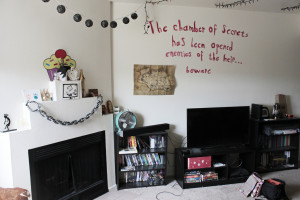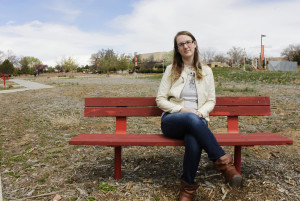Tags
Related Posts
Share This
Off-Campus Living

Kylie Yockey’s apartment utilizes handmade decorations and space to create a welcoming environment. Photo by Amaya Hoke
The open space of Kylie Yockey’s living room is decorated with paintings, bookshelves and Harry Potter references. “I’ve been waiting to live on my own for my whole life,” she says. Yockey is a junior Creative Writing major at Santa Fe University of Art and Design. After moving off campus May 2015, she and her two roommates at the time quickly adapted the space into something unique.
While for some, on-campus living is the perfect place to maintain familial independence while still having easy access to classes, food and events, not all students find dorm life appealing. In her freshman year, Yockey lived in King C100, a co-ed hall that had high traffic due to being used to access other halls in the King building. “Dorm life is not for me,” Yockey says. With easily 60 people living in a single hallway, things for Yockey were very cramped and often loud; an environment that for some can prove difficult to endure while balancing studies.
Amelia Wilson, a senior Creative Writing student, had different reasons for abandoning on-campus living arrangements. Like Yockey, Wilson and a roommate moved off campus in May 2015 after a particularly difficult event involving maintenance while living in the on campus apartments. “One time [my roommate and I] got home after a two hour movie and there were hundreds and hundreds of bugs in our [on campus] apartment,” Wilson says. While insects such as ants and beetles have proven to be repeat offenders all over not only the SFUAD campus but Santa Fe in general, Wilson felt that the situation was not properly handled. “We had to stay in a dorm for three days, and when we got back, they had left dead bugs everywhere.”

Amelia Wilson cooks to deal with the stress of classes. Photo by Amaya Hoke
Despite the experience, Wilson maintains that the on campus apartments were “a good middle ground transitioning from on campus to off campus.” The on-campus apartments provide privacy and utilities inaccessible to students living in the dorms. “You have your own space but at the same time, you’re still close to [events and classes],” Wilson says.
While living off campus can provide more freedom in work, exploration of Santa Fe and a wider community, actually landing housing can prove to be difficult. SFUAD has a two-year residency policy which for some, is too long. While it is possible to appeal against this policy, it requires a great deal of research, financial planning and impeccable grades to be released from the school’s housing contract. “It wasn’t too difficult,” Yockey says. “But it’s important to be thorough.”
Residency is not an obstacle for older or higher level students who have already completed their two years on campus; however, that does not mean finding outside housing will be easy. Santa Fe has a reasonably high cost of living while simultaneously having low income housing options. The downside is that while most students meet the requirements of low income housing, meaning they make under a certain amount of money a year, low income housing apartments will not lease to full time students. In Santa Fe, a low income apartment can be rented for as little as $550 a month, but because of refusing to rent to students, it is more common to look at a single bedroom apartment for $800 a month or more.

Kylie Yockey is a junior Creative Writing student at SFUAD. Photo by Amaya Hoke
Whether in a dorm or in an apartment, having roommates can considerably reduce the cost of living. When Yockey moved off campus, she had two roommates aside from herself splitting the rent, but after one of her roommates moved out, the financial burden became much more substantial. “I had to take on more hours at work. Money is tighter. Halving the rent hasn’t been fun but [my remaining roommate and I] manage.”
While living in an apartment can be considerably cheaper than living on campus and paying for an expensive meal plan, it doesn’t feel cheaper paying rent, bills and grocery money out of pocket rather than relying on loans and payment plans to lessen the blow. “Paying bills is the worst part,” Yockey says. “But I have so much more agency financially. It has made me more responsible.”
Although Wilson receives help from family with paying for her apartment, she still had to learn how to do tasks that those living in the dorms might not even be thinking about. “I think it’s a good transition to becoming a real adult,” Wilson says. “How do I pay bills? How do I set up an electric account? Before I came here, I didn’t know how to cook. Now I cook to relieve stress. I’m like Sylvia Plath.”
Living on campus has many benefits, including a tight-knit community, easily accessible cooked meals and a close proximity to classes; living off campus can be a great way to cut the umbilical cord, to explore the city and meet people other than students at SFUAD. Deciding whether to stay on campus or venture out into the public community is entirely up to the individual and their needs.






 Jackalope Magazine is the student magazine of Santa Fe University of Art and Design. Building on the interdisciplinary nature of our education, we aim to showcase the talent of our university and character of our city.
Jackalope Magazine is the student magazine of Santa Fe University of Art and Design. Building on the interdisciplinary nature of our education, we aim to showcase the talent of our university and character of our city.
Recent Comments